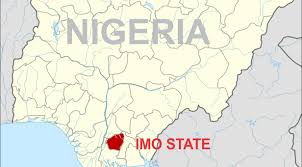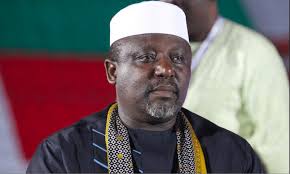The sectionalism that has become the character of the Nigerian politics appears to have been the bane of our development as a nation as it robs the people of the right persons in public offices. In other words, we have allowed our sectional sentiments to rule our reasoning at the polls. In the end, we install square pegs in round holes.
Ostensibly, it stems from the “top to bottom” line of flow of resources and command in the nation’s structure. The sharing of the national cake has always been presided over by whoever gets elected at the various levels, federal, state or local government. The baking of the cake gets the least consideration. We discover that elected men, under this arrangement, become invitees to the banquet hall while the electors or supposed oppositions are left outside the hall to peep through the window and whine over non-inclusion and marginalisation. For this reason, various sections jostle to have their men put into the hall where the banquet is holding, hoping to benefit in the long run. This is the reason for the sonorous calls for restructuring in order to install a system that ensures a good measure of equity in the polity.
The sectionalism has trickled down to the states and local governments to the extent that phrases such as zoning, rotation, shared prosperity, and the like have become parts of the lexicon in our politics. In Imo State, we hear of charter of equity, which refers to an unwritten arrangement among the politicians to rotate occupation of Douglas House, the seat of the state government, among the three zones in the state, namely, Okigwe, Orlu and Owerri. Just as the North and the South in Nigeria count the years for each other over the presidency and Aso Rock, so do the people of Imo constantly bury their heads in the arithmetic of who should pack into the Government House in Owerri at a particular time and who should not. Because the agreement is not water tight, and owing to some uncontrollable variables, implementation of this charter has proved problematic. And so, the struggle continues every electioneering year.
As a significant block in the Owerri zone, made up of the old Owerri Division, less Ohaji and environs, the first shot at the government house by Mbaise was in 1991 when one of their sons, erudite Prof. Fabian Osuji, emerged as the defunct Social Democratic Party (SDP) candidate for Imo State governorship election. He was enormously popular and was favoured to win the election that year. However, sentiments of that time were so caustic that machinations became so rife. For some inexplicable reasons, the federal government under military President Ibrahim Babangida disqualified him and ordered for fresh primaries in SDP.
Aware that the attack was not primarily on Prof. Osuji but on the clan that bore him, the people of Mbaise readily replaced him with Dr. Alex Obi as the SDP candidate in direct primaries that saw the late Dr. Ezekiel Izuogu losing out. The feeling was that Izuogu had edged out their son and so should not be allowed to benefit from the mischief. Due to this intraparty squabble, a finer and more favoured SDP at that time lost the governorship seat to its rival, the defunct National Republican Convention (NRC), for the Late Evan Enwerem to become governor.
In 2019, the victory of another son of Mbaise, Rt. Hon. Emeka Ihedioha, who became governor of Imo State, launched the clan into limelight. As if he came in to prove a point, the former governor defied all odds and set at work – massive road constructions, aggressive sanitation, recovery of state’s stolen property, clearance of arrears of salaries and pensions, complete revitalisation of the local governments, security, health, and restoration of financial propriety, among others. In his tenure, the state was top on the list of corruption free states in Nigeria. Under seven months, the smiles that vanished from the face of Imo people prior to Ihedioha’s arrival at the Government House returned. Relative peace descended on the state and the people enjoyed harmony.
There appeared to be a firm resolve in that administration to show the world the goodness of Mbaise, that traducers were responsible for the unhealthy and unsubstantiated tags on the clan of decent, hardworking people. Then, seven months, just seven months after, the Mbaise presence in Douglas House was scuttled by a controversial Supreme Court judgement that removed Ihedioha.
Some people had asked whether it was the perception of Mbaise that was the problem while others who understood the underpinnings of our national politics conjectured other reasons for his untidy ouster. As for the stereotypical attitude of the core Owerri towards Mbaise, which quickly influenced the thinking and perception of Mbaise by others, history has an explanation.
The issue dates back to the 1930s and 40s, when the quest for the creation of an Mbaise Division took the better part of the sons of the area, such prominent sons as the late Dennis Nwachukwu Abii, the late Eze Pius Nwoga, the late Joseph Jamike Iwunna, to mention but a few, who, being intellectually loaded, bubbled with ideas and sought political space in the then Owerri Division as created by the colonial masters.
Their contemporaries who hailed from core Owerri appeared to have dominated the show, leaving little space for these promising intellectuals coming up from areas on the fringe of Owerri, such as Ahiara, Ekwerazu, Ezinihitte, Oke Ovoro, and Agbaja comprising Nguru, Okwuato and Enyiogugu, five clans on the whole.
History has it that when these people pushed for the new division, their counterparts from core Owerri never gave them a chance of success. But using their wisdom and doggedness, they were able to convince the British officials to approve the new division even before it got its name. At the meeting where they were to choose a name, records have it that a young man and one of the advocates of the new division named Jamike Joseph Iwunna suggested the name “Mbaise”, having counted the number of clans that were to make up the division. This was adopted. Note that Ngor Okpala was to be the sixth clan, but they opted out at the last minute.
Stunned at this feat, the core Owerri who doubted their success felt deflated. Naturally, what followed was a season of smear campaign against the persons of ndi Mbaise – You have come to show us your Mbaise sense, they would say. The concept of “Mbaise sense” persisted and spread to other parts of the state, such that it became a tool for blackmail in the hands of those who happen to have dealings with the Mbaise persons and having the intention to cheat them. The dubious ones first paint the Mbaise man in a particular hue, a situation that prompted a popular musician and son of the area, the Late Sir Warrior, to sing a song saying, “onye mka nma akoolam onu” (the one I’m better than is maligning me). Perhaps this explains why Owerri Zone as a bloc cannot come together to pursue political interests in the modern times as there has been no love lost among the constituents of the zone.
It must be noted that Mbaise is made up of diverse people who are not of a common descent and so no particular behavioural threats can be ascribed to them. They are held together by a common sense of determination to attack marginalization by getting a distinct political space to operate.
Mbaise rued the ouster of Ihedioha as governor in 2020, not so much about the exceptional benefits they expected from his administration but because an opportunity to rewrite a wrongly couched statement about them had been lost, just as the people of Obowo used the four years of the late Sam Mbakwe to disprove the lies against them in the old. However, his seven months presence made a positive impact as has been acknowledged by a generality of the Imo people.
Something about Mbaise is that their population is capable of significantly tilting election results in favour of whoever finds favour with them, barring high calibre rigging and court decisions.
The sectional politics that has befallen Nigeria is likely to remain with us until the much desired restructuring takes place in the entire political framework of the nation. However, it is important that we do not lose our senses, even in the present circumstance, in the choice we make about those into whose hands we thrust positions of authority. No matter where the candidate came from, we must focus more on competence, ability, and more importantly the candidate’s performances antecedent to his arrival for the contest. Only the uneducated would allow stereotypes to becloud his reasoning. Keep your eyes on the ball for 2023.
Dr. Odu can be reached at dirimrich2018@gmail.com, dirimrich@yahoo.com or text 07056207620









